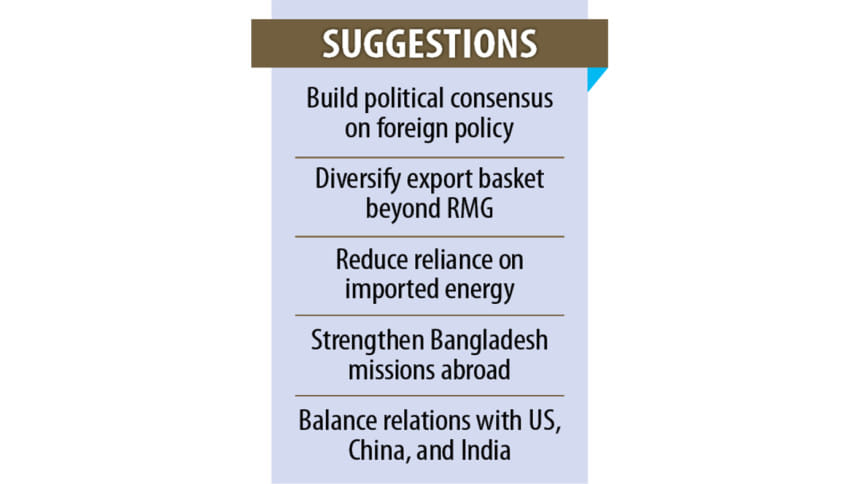Must tackle internal divides to navigate global rivalry

Foreign policy experts and politicians have called for addressing divisive politics, economic vulnerabilities, and human rights concerns to safeguard Bangladesh's strategic autonomy in an increasingly bipolar world.
They said many developing countries are struggling to maintain balanced foreign relations amid the growing rivalry between US- and China-led blocs.
The observations were made at a dialogue on Bangladesh's foreign policy organised by the Centre for Governance Studies (CGS) at the CIRDAP auditorium in the capital yesterday.
"The world is certainly getting bipolar. How we will navigate it will depend on our internal strength," said Bangladesh Enterprise Institute Chairman and former ambassador M Humayun Kabir.
He said Bangladesh suffers from a tendency toward internal conflict, which hampers the formulation of a strong foreign policy. Political actors often use foreign alliances to undermine their opposition, he added.
Kabir also said while the US reviews its foreign and defence policies every four years, Bangladesh has made only two minor adjustments since 1972.
He stressed the need to diversify the export basket, currently dominated by the RMG sector, and adopt robust policies to reduce dependence on imported energy, a strategic commodity.
CGS Executive Director Parvez Karim Abbasi said the global order is witnessing a Cold War-like atmosphere, with the US remaining the leading economy and the dollar still held in most countries' reserves.
At the same time, he noted, Bangladesh cannot afford poor relations with China, a major supplier of raw materials, or with India, which surrounds the country.
"So, we have to equally balance two of these powers with delicacy," he said.
Maj Gen (retd) ANM Muniruzzaman, president of the Bangladesh Institute of Peace and Security Studies (BIPSS), outlined several key priorities for Bangladesh's foreign policy, including defending human and labour rights, tapping into maritime resources, ensuring maritime security, and engaging in effective water diplomacy.
"We must enhance our capabilities in cybersecurity. We need to acquire new skills in technology. We must think about how to align ourselves with all countries," he said.
He also called for incorporating private sector input into diplomacy, strengthening climate diplomacy, and bolstering Bangladesh missions abroad to better protect expatriate interests.
He emphasised the need to revitalise Saarc.
Muniruzzaman said the revolutionary aspirations of the country have not been reflected in the Ministry of Foreign Affairs and called for the removal of those who collaborated with fascist regimes.
Former ambassador Munshi Faiz Ahmad stressed the importance of consensus among political parties on foreign policy, which he said must reflect the people's aspirations.
He warned that Bangladesh is not adequately prepared to navigate the challenges of graduating from LDC status next year.
Zahir Uddin Swapon, member of the BNP Chairperson's advisory council, called for a shift in political culture to bring harmony in foreign policy.
He said the Bay of Bengal is a key strategic zone within the Indo-Pacific region and a crucial economic corridor for the eastern sphere, making Bangladesh's position vital.
"Whoever comes into power in the next elections needs to keep all of these things in mind in designing their foreign policy," he said.
Former ambassadors M Shafiullah, Munshi Faiz Ahmad, and Shahidul Islam; Adviser to the BNP acting Chairperson Mahdi Amin; Jatiya Party Secretary General Shameem Haider Patwary; AB Party Chairman Mojibur Rahman Monju; BIPSS Senior Research Fellow Shafqat Munir; Centre for Non-Resident Bangladeshis Chairman M S Shekil Chowdhury; Gonosamhati Andolon Chief Coordinator Zonayed Saki; and Gono Odhikar Parishad President Nurul Haq Nur also spoke at the event, which was moderated by CGS President Zillur Rahman.

 For all latest news, follow The Daily Star's Google News channel.
For all latest news, follow The Daily Star's Google News channel. 



Comments